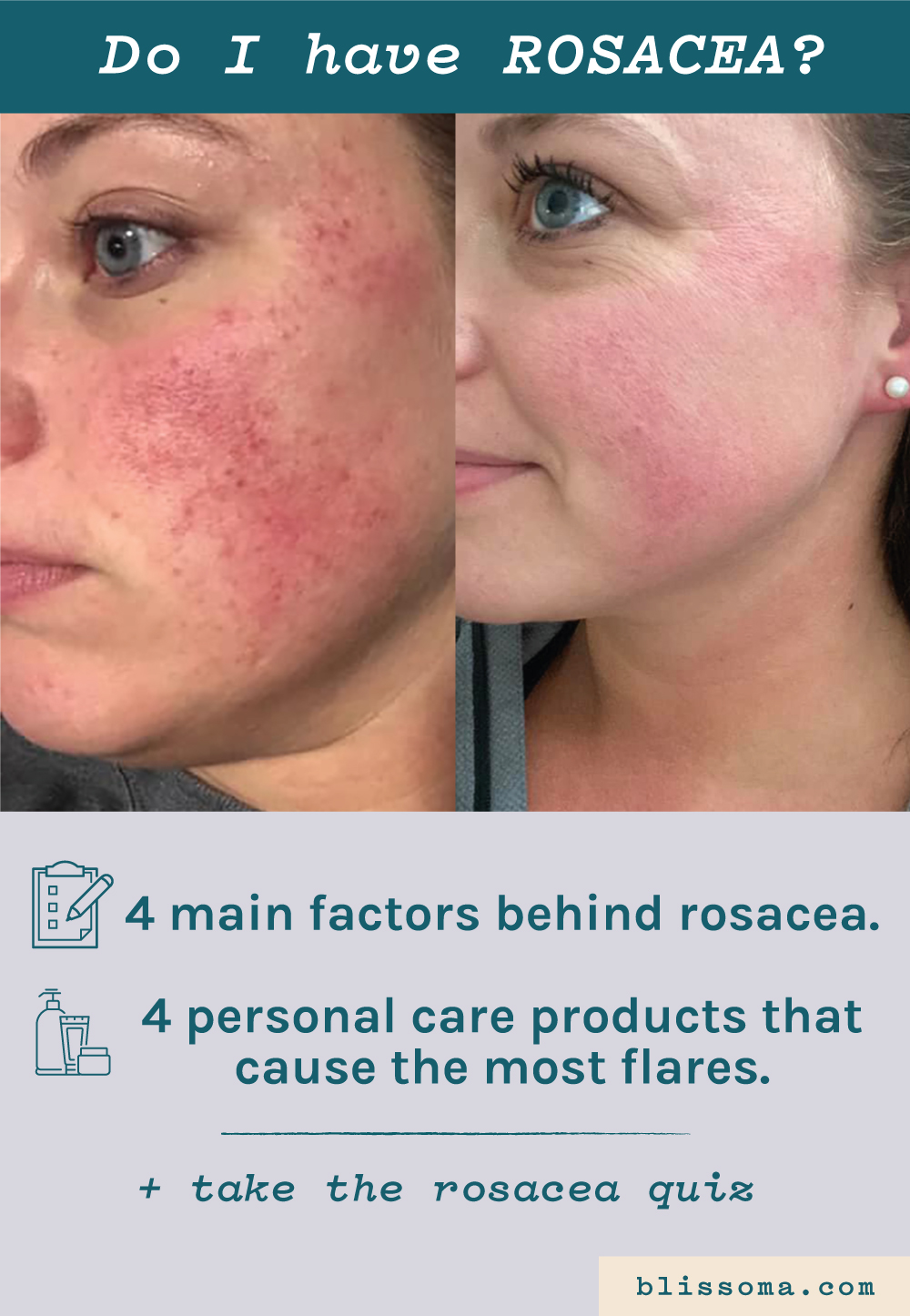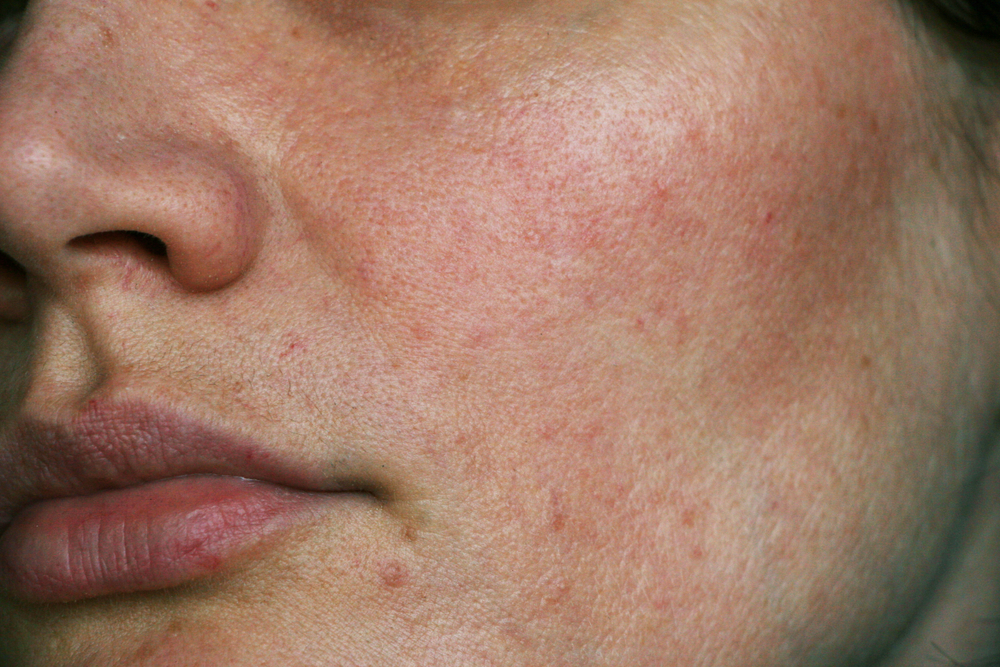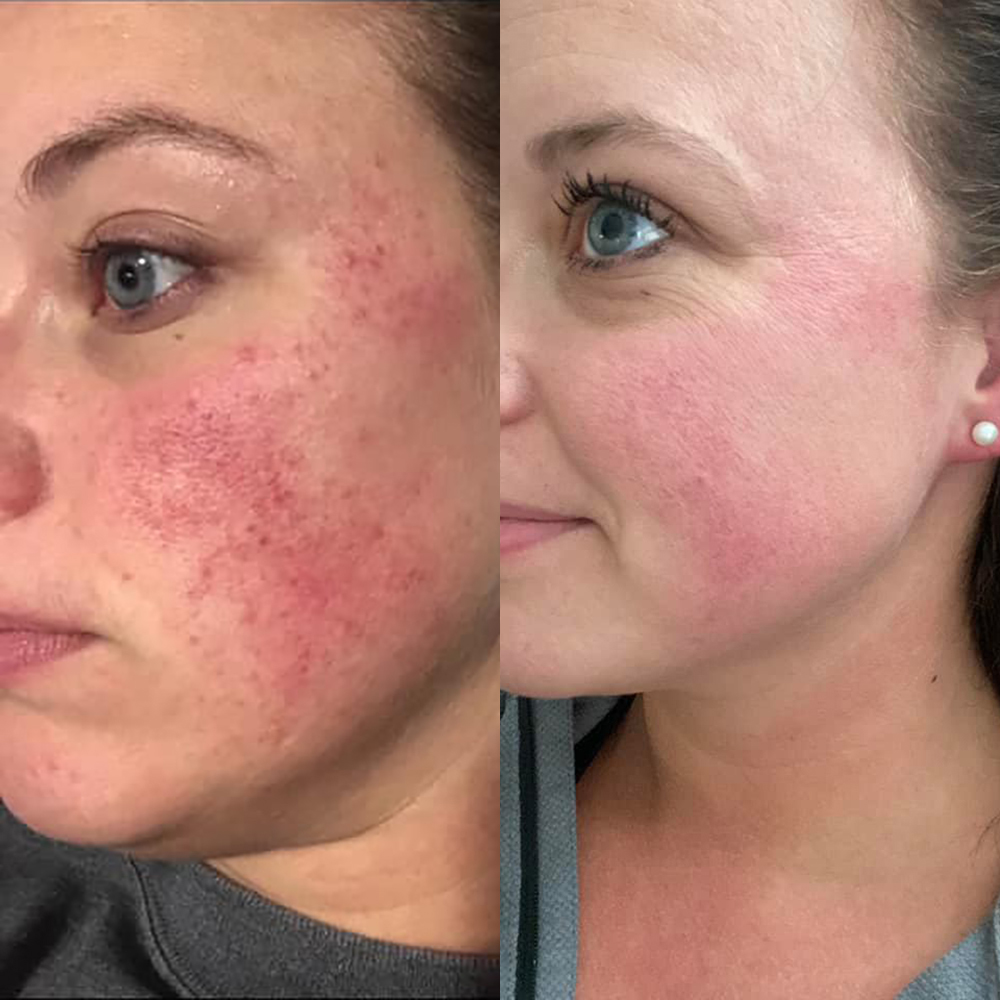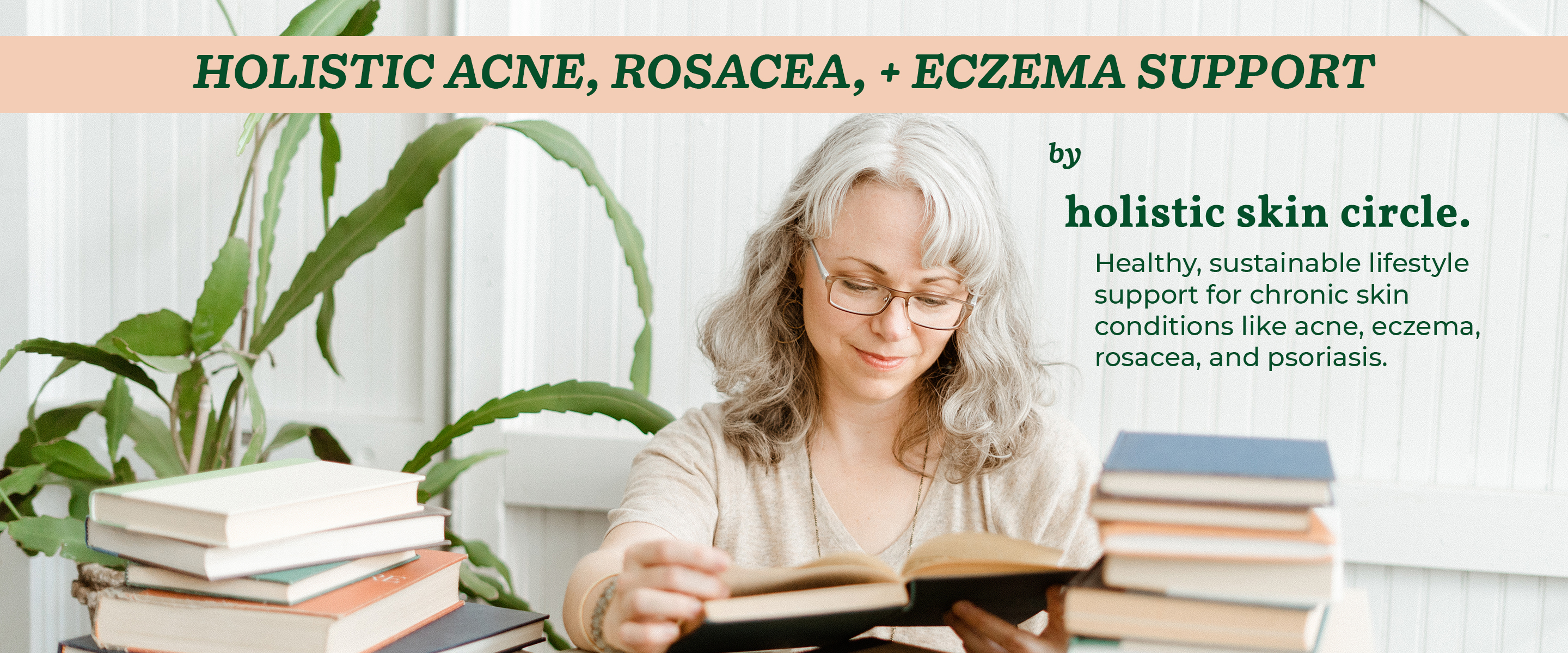All skin types can become red or flushed at times. But if you feel your facial redness is more persistent than it used to be or seems to have flare-ups, it may be time to consider rosacea. Learn more about the symptoms of this condition, take our "Do I Have Rosacea" quiz, and get and some natural skincare rosacea tips.
Rosacea is a common skin condition which, according to the American Academy of Dermatology (AAD), affects more than 14 million people in the U.S. The condition presents as redness or flushed skin most commonly on the nose, cheeks, forehead, and chin. Rosacea can also include swelling, visible blood vessels, small pimples, irritation, and redness of the eyes.


What Is the Main Cause of Rosacea?
While in the past there’s been no definitive evidence as to the cause of rosacea, scientists have found that a predisposition to this skin condition can run in families. Recent scientific evidence is pointing to overactivity or dysfunction of the immune system and how it relates to vascular health as an underlying cause of rosacea.
Four main factors work together to cause the symptoms of rosacea:
- Dysregulation of the immune system
- Dysregulation of neurovascular signaling
- Chronic inflammation
- The overgrowth of micro-organisms and changes in the microbiome
A 2019 study has now linked the skin microbiome to the cause and severity of rosacea. In this study, researchers found that the skin’s microbiota (bacterial environment) varies between healthy skin and those with rosacea. For instance, Campylobacter bacteria (also known as H. pylori) appears to be more abundant in the skin of people with rosacea, the same bacteria present in the gut microbiome of people who have gastrointestinal diseases like ulcerative colitis.
Differences can also occur in the gut microbiome of people with rosacea, and an association has been found between rosacea and irritable bowel syndrome, small intestine bacterial overgrowth, and inflammatory bowel disease.

Another link to the symptoms of rosacea could be mites on the skin. Before you start feeling creepy-crawly microscopic Demodex mites live on everyone’s skin and are a normal part of the skin microbiome. These little mites tend to gravitate to the nose and cheeks, spots where rosacea is often most prominent. It appears that people suffering from rosacea might have more mites on their skin than those who don’t have rosacea.
What's more the Demodex mite has a bit of a sloppy lifestyle. They can cause growth of types of bacteria related to higher levels of inflammation, and can transfer bad bacteria from one spot to another as they move around. Their messes can mean more inflammation for you.
Skincare can cause rosacea to flare
All these challenges and inflammation can mean that your skin just doesn't work like it should, and it becomes "leaky". Skin with rosacea allows valuable hydration to escape, creating dryness even if you're producing normal levels of sebum. More things that you touch can also make it past the surface of skin too, triggering more inflammation and sensations like stinging when you use cosmetics and skincare.
The National Rosacea Society conducted a survey and found that 82% of respondents with rosacea reported having sensitive skin and reactivity to different cosmetics and skincare products. The biggest types of problem cosmetic and skincare products for people with rosacea were astringents and toners, soaps, and exfoliants. All of these types of products can contain ingredients that challenge the integrity of the skin barrier, which is already damaged in rosacea.
Makeup, perfume, hair spray, shampoo, and shaving lotion were also common types of products to cause rosacea flares.
However, skincare can also be a part of soothing the feeling of flares and dryness when you pick the right products. Another study found that properly formulated skincare products that are free of allergens and irritants can help improve skin barrier function and increase hydration and comfort for people with rosacea.
The most important skincare products for rosacea:
- A non alkaline, Ph correct cleanser
- Moisturizers with mild emulsion systems that will not strip skin lipids
- Moisturizers with humectants, emollients, and occlusives
- Formulas without allergens and irritant ingredients
Once the skin barrier is stronger you may experience less reactions from things that used to trigger rosacea flares, creating greater peace with your skin.
Natural skincare benefits the microbiome with rosacea
Like many chronic conditions rosacea must be managed since there is no cure. Taking good care of your skin microbiome can visibly improve the appearance and comfort of your skin, though, and there are ways you can approach it with natural skin care.
It can be tempting to try topical prescription medications for help in soothing your rosacea symptoms. But note that there are many synthetic skin-disruptive ingredients in both conventional and prescription skin care products that tend to strip the skin of essential bacteria which can worsen rosacea. Skin irritation can result from from prescription creams just like from using the wrong over-the-counter product.
Synthetic preservatives are particularly suspect when it comes to skin microbiota imbalance. Some conventionally-used preservative ingredients, like phenoxyethanol or parabens, can inhibit beneficial microbial growth, exacerbating your rosacea symptoms.
Naturally preserved skincare products can have a more beneficial impact on the skin microbiome because of how they work. Natural preservation ingredients are usually more gentle, and rely on specific Ph conditions, concentration, and synergies with other ingredients to do their jobs. Their activity often breaks down outside of these optimal conditions, so you won't be killing the good bacteria that can help your skin stay healthy.
Natural, plant based skincare also uses the gentle emulsification ingredients necessary to protect sensitive skin with rosacea. Protective natural oils and butters provide the emollients necessary to help hold moisture into the skin.
Avoid excessive cleansing and make sure to moisturize. Oatmilk is one natural ingredient that works to calm visible signs of redness and irritation on skin by providing deep hydration to multiple layers of skin. Antioxidant green tea works to gently cleanse the skin of impurities while lending a sensation of protection. And long-revered calendula works to minimize the appearance of redness and leave skin feeling calm.
For real life natural skincare rosacea results, take a look at the amazing photos from one of our clients who has rosacea.

Photos of Blissoma natural skincare rosacea results courtesy of Karmin Keller, Esthetician at Evergreen Rituals
The client shown is a nurse who works the COVID unit wearing a mask all day. Her rosacea was pronounced and she decided to invest in a natural, professional quality skincare routine from Blissoma. The results were achieved in about 7 weeks of consistent product use.
Her routine included these natural skincare products:
Free Rejuvenating Herbal Gel Cleanser
Flawless Clear Condition Facial Oil
These products are unscented, Ph correct for skin, and designed to offer hydration and emollience.
The skin and gut microbiomes work together to maintain balance, so it’s also important to eat a clean diet with plenty of fresh organic foods. Keep an eye on skin flare-ups related to food as well to see if you can link them to a food that might be causing problems for your digestion and skin.
Myths and Questions About Rosacea
Some of the myths surrounding rosacea are that only people with fair complexions can show signs of the condition, that rosacea causes acne, and that it is just skin irritation. You may ask yourself…Do I have rosacea or acne? Do I have rosacea or just red cheeks? Do I have rosacea or eczema? Why do I have rosacea all of a sudden?
As we mentioned above, all skin tones and types can be vulnerable to rosacea. The redness associated with the condition can look like flushed cheeks, or deeply red and swollen, but it is usually much more persistent than blushing or minor irritation.
Yes, rosacea sometimes comes with tiny pimple-type bumps, but this doesn’t mean that rosacea causes acne or the other way around. These bumps and pimples occur when rosacea is left untreated or in severe cases of the condition.
While rosacea can feel irritated, it is not the result of irritation. Some people do experience stinging or burning with flare-ups. Rosacea often comes on after the age of thirty, so if you are seeing flare-ups as an adult, this could be the cause.
Take Our Do I Have Rosacea Quiz
Rosacea can be a tricky and confusing skin issue. Take our rosacea quiz to determine if you might be experiencing signs of this skin condition.
- Do you experience the appearance of redness on your nose, cheeks, forehead, and chin on a regular basis?
- If you answered yes to the first question, has this appearance of redness gotten worse over time?
- Do you experience a stinging sensation in affected areas?
- Does your skin flush or blush easily?
- Have you noticed more frequent bouts of flushing?
- Do your nose and cheeks appear constantly red, like a sunburn that won’t go away?
- Does even a little bit of sun exposure cause redness in your skin?
- Does the skin of your cheeks feel dry and papery?
- Do you have the appearance of acne or blemishes on the red areas of your face that look like little pus-filled bumps but with a lack of blackheads?
- Do you have visible capillaries on your face?
- Does the appearance of redness on your face seem to flare up with exposure to hot temperatures, hot showers, exercise, alcoholic beverages, spicy foods, or emotional changes?
- Do your eyes appear bloodshot a lot of the time?
- Do you also deal with any digestive problems like SIBO, IBS, or inflammatory bowel disease?
- Are you 30 years old or older?
If you answered yes to two or more of the above questions, it’s time to take a closer look at your skin concerns. You could be dealing with rosacea. Have more questions? Try our Holistic Skin Consultation and get professional help for your rosacea.
You can also join our Facebook support group for people with acne, rosacea, and eczema for ongoing discussion and tips.
Disclaimer: The information contained on this site is general in nature and for informational purposes. It is not meant to substitute for the advice provided by your own physician or other medical professional. None of the statements on this site are a recommendation as to how to treat any particular disease or health-related condition. If you suspect you have a disease or health-related condition of any kind, you should contact your health care professional immediately. Please read all product packaging carefully and consult with a healthcare professional before starting any diet, exercise, supplementation or medication program. Cosmetic products have not been evaluated by the Food and Drug Administration and are not intended to diagnose, treat, cure, or prevent disease.



